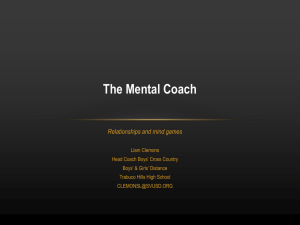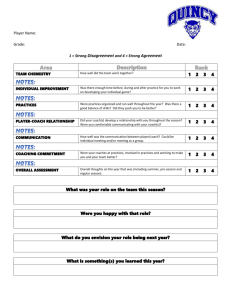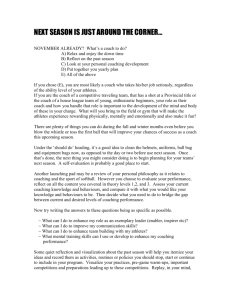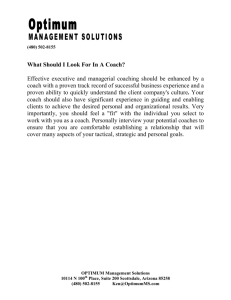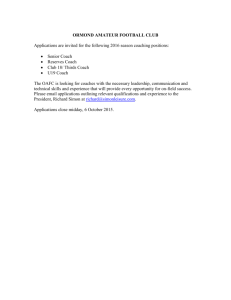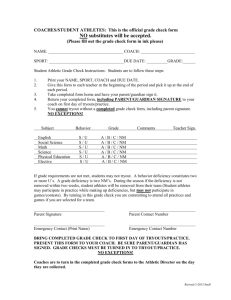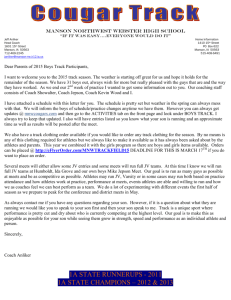Building Success as a Young Coach
advertisement
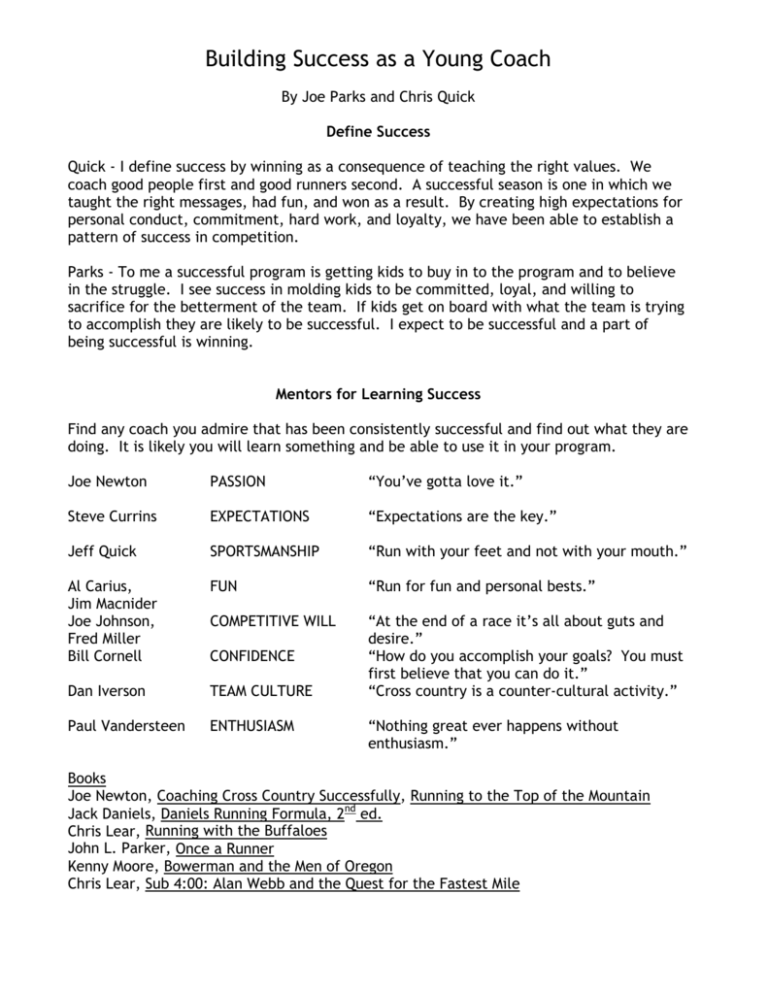
Building Success as a Young Coach By Joe Parks and Chris Quick Define Success Quick - I define success by winning as a consequence of teaching the right values. We coach good people first and good runners second. A successful season is one in which we taught the right messages, had fun, and won as a result. By creating high expectations for personal conduct, commitment, hard work, and loyalty, we have been able to establish a pattern of success in competition. Parks - To me a successful program is getting kids to buy in to the program and to believe in the struggle. I see success in molding kids to be committed, loyal, and willing to sacrifice for the betterment of the team. If kids get on board with what the team is trying to accomplish they are likely to be successful. I expect to be successful and a part of being successful is winning. Mentors for Learning Success Find any coach you admire that has been consistently successful and find out what they are doing. It is likely you will learn something and be able to use it in your program. Joe Newton PASSION “You’ve gotta love it.” Steve Currins EXPECTATIONS “Expectations are the key.” Jeff Quick SPORTSMANSHIP “Run with your feet and not with your mouth.” Al Carius, Jim Macnider Joe Johnson, Fred Miller Bill Cornell FUN “Run for fun and personal bests.” COMPETITIVE WILL CONFIDENCE Dan Iverson TEAM CULTURE “At the end of a race it’s all about guts and desire.” “How do you accomplish your goals? You must first believe that you can do it.” “Cross country is a counter-cultural activity.” Paul Vandersteen ENTHUSIASM “Nothing great ever happens without enthusiasm.” Books Joe Newton, Coaching Cross Country Successfully, Running to the Top of the Mountain Jack Daniels, Daniels Running Formula, 2nd ed. Chris Lear, Running with the Buffaloes John L. Parker, Once a Runner Kenny Moore, Bowerman and the Men of Oregon Chris Lear, Sub 4:00: Alan Webb and the Quest for the Fastest Mile Models of Success – Where do you look for how it is done right? Program models Quick – Programs I have studied and emulated at times include York high school, Schaumburg high school, Moline high school, and Naperville North high school as well as maintaining the traditions from the Palatine boys and girls programs. Parks – I don’t so much model any specific program, but do have similarities in all the above. I have studied successful programs (college and HS) and took bits and pieces of their training and team philosophies. Much of what I’ve learned and believe in is based off of what other successful programs are doing. Weak Model of Success Lone wolf coach Powerful Model of Success Coach owns the team Sharing coach, seeks mentors and strong assistants Team owns the team Attitude of cockiness, brashness Attitude of quiet confidence Inflexibility of approach Flexibility of approach Coaches only the good runners Coaches all runners Waits for talent Develops talent Focuses only on running Masters all the details One season coach Coaches both cross country, track In-season vision Year-round vision Single season visions for athletes Career visions for athletes Negative reinforcement Sees a positive aspect in every athlete Contains work within the season Works on the program every day, year-round Succeeds when the athletes push to success Creates a team culture of success Sticks to the same schedule every year Seeks out new information and experiments Expects athletes to be self-motivated Motivates his athletes Accepts little input from the athletes Effective communicator and listener Poor role model Leads by example Lacks enthusiasm in the everyday routine Displays genuine excitement about the team Athletes have too much say Tough, but fair Needs short-term results Patient with team and individual athletes Details for Success – What little things lead to big success? Goal-setting meetings – How good does the team want to be? Meet with them before each season and have them tell you what they want to accomplish. Coach the team to whatever level it asks. Also, meet with each kid after each season to discuss the season and goals for the future. Body maintenance – Stretching after runs, ice baths, foam rollers, stretching ropes, sticks Form running – Coach posture and technique - drills, 10 x 100 or 4 x 200 or 3 x 300 or 5 x 150 every day Core strength – Push-ups, sit-ups, planks each day, full 20 minute core routine three times a week Motivation – Letters to the team on big meet days, cross country bulletin board, team meetings (infrequent, but high impact and inspirational – use them judiciously) Marketing – Web site, tons of team gear, Palatine Invite, message board, tons of pictures Mileage – Chart and own the workloads, personalized mileage charts for summer and winter running, web site miles Race tactics – We work on something in every single race, develop race tactics for state meet Fun – Manderson Invite, Polar Bear Shuffle, Ultimate Frisbee, bocce ball, Devil’s Lake, Camp Sand, team dinners, post-season banquet, Relay for Life, Quarter Challenge, ice cream social, Polar Bear Christmas party (white elephant), The Weekly Planet Pack – No one works out alone – teach kids to run with their teammates Pacing – Teach athlete monitoring of pace - half-mile, mile markers, using a running watch Reading – Post-season books, motivational books Finishing – Fast running last half of each run Course – Personalize and own your home course – the Twilight Zone, writing on course, the Larson turn, Barrington Rock, rake parties, team, coach, and maintenance men ownership of our grounds Alumni involvement – Continued running with the team in Park District program, introduction of “AllTime Great,” maintenance of team history Community running – Workers at Twin Lakes triathlon, volunteer at Exterra series, work at Running Unlimited, No Frills, Early Bird Summer running Final Note: Both of us believe that the most important ingredient to a successful program is the die-hard, yearround commitment of the coach. You will get out of a program what you put into it. It is hard to beat a man or woman who wakes up each day with the intent of improving his or her program. If you want to be successful, you have to want it bad. Of course, for any good coach, you will be so passionate about running and the sport that these thoughts will be a joy rather than a burden. Your passion and commitment determine the level of success. In our experience, success is only limited by two things: 1) inability to seek right methods of running a program and 2) unwillingness to work hard each day to implement these methods.
